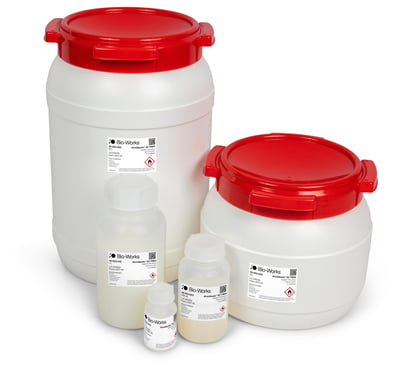Ion exchange chromatography (IEX) resins
WorkBeads resins for ion exchange chromatography (IEX) demonstrate high-resolution separation while giving low back pressure to increase your biomolecule's purity.
Ion exchange chromatography (IEX) resins
IEX resins that deliver high-resolution separation
 WorkBeads™ resins for ion exchange chromatography are designed for research and industrial scale purification of proteins, peptides and oligonucleotides by utilizing the difference in their surface charge. These resins demonstrate high-resolution separation while giving low back-pressure to facilitate both capture and polishing purification applications in standard bioprocess columns.
WorkBeads™ resins for ion exchange chromatography are designed for research and industrial scale purification of proteins, peptides and oligonucleotides by utilizing the difference in their surface charge. These resins demonstrate high-resolution separation while giving low back-pressure to facilitate both capture and polishing purification applications in standard bioprocess columns.
- High throughput and purity
- Reliable and reproducible results
- High chemical stability for easy cleaning-in-place
WorkBeads 100S is a strong cation exchanger and will bind positively charged substances. WorkBeads 100Q is a strong anion exchanger and will bind negatively charged substances. WorkBeads 40S is a strong cation exchanger with sulfonate ligands and will bind positively charged substances. WorkBeads 40Q is a strong anion exchanger with quaternary amine and will bind negatively charged substances. WorkBeads 40 DEAE is a weak anion exchanger with tertiary amine ligands (diethylaminoethyl) and is an alternative to WorkBeads 40Q when looking for alternative selectivities.
Principle of ion exchange chromatography (IEX)
Ion exchange chromatography (IEX) is a technique used for the purification of biomolecules, such as proteins, peptides, and oligonucleotides, by utilizing the difference in their surface charge. The biomolecules interact with the immobilized ion exchange groups on the chromatography resin with opposite charges. The strength of the binding will depend on the number of charges involved in the interaction and the distribution of the charges on the surface of the biomolecule. Charges on the biomolecule that are the same as on the resin may reduce the interaction by repulsion.
Ion exchange chromatography is one of the most frequently used chromatography techniques because of its versatility and ability to separate proteins even with slight differences in charge and because the eluted protein is usually concentrated. It is also one of the more cost-effective chromatography techniques and is, therefore, excellent for scale-up.
WorkBeads give unbeatable results for biomolecule purification
WorkBeads are agarose-based chromatographic resins manufactured using a proprietary method that results in porous beads with tight size distribution and exceptional mechanical stability. Agarose-based matrices have been successfully used for decades in biotechnology purification, from research to production scale, due to their exceptional compatibility with biomolecules, including proteins, peptides, nucleic acids, and carbohydrates. WorkBeads resins are designed for separations requiring optimal capacity and purity.
Don't hesitate to contact us about receiving a sample resin to ensure purification success on your target molecule.